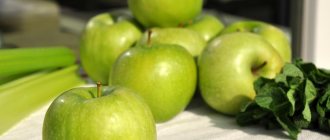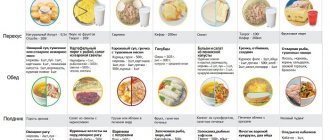Three-month mark: changes in mother’s diet
3 months after birth, the mother’s vegetable diet significantly expands
By 3 months of life, the baby’s body, as a rule, has already become stronger, its natural defense mechanisms are working almost at full strength. The baby is no longer considered a newborn and is less likely to experience digestive difficulties due to foods in the mother’s diet. However, as before, the only source of nutrition for a baby is mother’s milk, which contains the vitamins and minerals necessary for its full development.
Breastfeeding experts are of the opinion that a nursing woman does not need to follow a strict diet, but her diet should be balanced, consisting of healthy and hypoallergenic foods. At the age of three months, the mother’s menu can be gradually expanded to include complex dishes from healthy products, which previously were more likely to cause colic or allergies in the baby than now. The time of “strict diet” is behind us.
The main principle of a balanced diet 3 months after childbirth is to include nutrient-rich foods in the daily menu in a certain ratio:
- Cereals and foods rich in complex carbohydrates. Mom needs a lot of energy to produce milk and care for the baby. It is recommended to eat cereal products mainly in the first half of the day, so as not to have a negative impact on a woman’s figure. About 40% of the daily diet should be carbohydrate foods containing fiber (cereals, durum wheat pasta, whole grain bread, etc.). At 3 months, the mother can include pearl barley and other types of cereals with gluten in her diet, which could previously cause colic in the baby.
- Vegetables and fruits. Unlike previous periods, now the fruit and vegetable menu can be more varied. So, brightly colored foods (tomatoes, bell peppers, beets, berries and others) may appear in the diet. It's time to introduce onions and garlic into your diet. The share of vegetables and fruits in a mother’s daily nutrition pyramid is about 30%.
- Protein food. Animal protein is necessary for the growth and development of the baby, maintaining the well-being of the mother. 3 months after giving birth, the meat and fish menu becomes more varied - it’s time to try pork, offal, and red varieties of fish. Meat and fish must be on the menu at least 2 times a week, chicken eggs - 2-3 pcs. per week or quail eggs - 8–10 pcs. in Week. It is advisable to eat soups with meat or fish broth every day. Mom can also allow herself to eat a handful of nuts. Dairy and fermented milk products should also be included in the daily menu. You can drink 2 glasses of milk, 0.3 liters of fermented baked milk, yogurt or kefir per day. Sour cream (up to 50 g), hard cheese (50–70 g) and butter (5–10 g) are allowed in smaller quantities. Protein-rich foods account for about 20% of the daily diet.
The remaining 10% of the mother’s daily diet consists of vegetable oils, confectionery, drinks and other products that she consumes in small quantities. The proportion of sweet treats should still be kept to a minimum. It is recommended to give up “chemical” sweets, chocolate, soda - these products often provoke allergies in children of any age. Homemade baked goods, marshmallows, marshmallows, and dried fruits will help your mother satisfy her sweet tooth without harming her baby.
The preferred methods of cooking 3 months after birth remain boiling, stewing, and baking. However, now mom can fry the food a little before stewing. For example, brown carrots and onions for soup, meat for pilaf or other complex dishes. This can only be done if mother and baby have no digestive problems.
Table: what you can eat three months after giving birth
| Product group | Meat and meat broths | Fish | Cereals/pasta | Dairy | Beverages | Eggs | Fruits | Vegetables | Vegetable oils | Pastries and sweets | Nuts | Leafy greens |
| Cooking methods | Cooking, stewing, baking | Cooking, stewing, baking | Boiled, as a side dish or as part of dishes | Pasteurized, ready to eat | Warm or at room temperature | Hard Boiled | Fresh, baked, pureed, compote | Fresh, boiled, stewed, baked | Without heat treatment | Ready to eat | Fresh, dried | Fresh or boiled as part of complex dishes |
| Preferred Product Varieties | Rabbit Veal Turkey Chicken Lean pork By-products | Cod Pollock Hake Pike perch Salmon | Buckwheat Rice Barley Corn Oatmeal Wheat Pearl barley Durum wheat pasta | Pasteurized milk Kefir Yogurt Cottage cheese Ryazhenka cheese Sour cream Butter | Black tea Green, white tea Fruit and berry fruit drinks Compotes Chicory Freshly squeezed juices Kissel | Chicken Quail | Apples Pears Bananas Kiwi Apricots Local berries Plums Dried fruits | Zucchini Broccoli Cauliflower Potatoes Bell peppers Cucumbers Tomatoes Onions Carrots Pumpkin Green beans Beetroot Celery Broccoli | Olive Sunflower Corn Pumpkin | Crispbread with whole grains Bran bread Biscuits Marmalade Marshmallow Pastila | Walnuts Almonds Cashews Hazelnuts | Spinach Arugula Salad Dill Parsley Green onions |
Undesirable foods at 3 months of breastfeeding
Allergenic foods - chocolate, citrus fruits, strawberries, peanuts can cause unwanted reactions in the baby
In some cases, the diet of a nursing mother remains limited 3 months after birth. Most often, mothers of infants prone to allergies are forced to adhere to a strict diet. At the same time, babies who have not previously experienced such problems may react negatively to new foods in their mother’s diet, so they need to be introduced gradually, starting with minimal portions.
Allergenic products include:
- cocoa, chocolate;
- citrus fruit;
- strawberry;
- peanut;
- seafood.
There are also foods that are difficult to digest in the stomach and often cause flatulence, colic or diarrhea. At the same time, they are rich in nutrients necessary for the development of the baby and the well-being of the mother, so you should not refuse them. At the age of three months, the baby begins to be introduced to the menu in small quantities:
- white cabbage;
- legumes;
- grape;
- cucumbers;
- plums and others.
There is also a list of foods that are extremely undesirable in the diet of a nursing mother. These types of food and drinks not only do not benefit the woman and the baby, but can also negatively affect their well-being. It is recommended to completely exclude:
- alcohol;
- fast food;
- strong coffee;
- canned and pickled foods;
- fast food;
- Forest mushrooms;
- mayonnaise;
- products with chemical additives.
When my son turned 3 months old, I finally breathed a sigh of relief. The frequency of colic decreased noticeably, night sleep improved, and the child was in a good mood more often than in the first months. My diet during this period became much wider - I almost returned to my prenatal menu, excluding, perhaps, only citrus fruits, chocolate and fast food. At the same time, I could afford to treat myself to small quantities of store-bought desserts, treat myself to ice cream and fresh fruit. I have two children, and when I compare how they feel at 3 months of age, I find a lot of similarities. For example, in the first month in both cases it seemed to me that I had little milk, the children did not get enough to eat and therefore were constantly worried. When I realized that the problem was in their digestion, I tried to follow a diet and exclude any foods that provoke colic. As a result, I came to the conclusion that I ate almost only buckwheat and chicken, but the colic did not go away. And only after 3 months after giving birth, lactation stabilized, my moral state and the well-being of the children finally improved. I concluded that in the first months, of course, it is worth carefully selecting the menu, avoiding allergenic and gas-causing foods. However, once the baby reaches 3 months of age, you can diversify the diet - this will benefit both mother and baby. Especially if this period falls in the summer months and there are various vegetables and fruits from the garden plot freely available. But do not forget that all children are different, and their reaction to the product may differ. To avoid problems, try new products little by little and watch your baby.
How many times and in what quantity should the mixture be given??? - formula feeding after how long
How to feed formula by the hour or on demand???
I’ve been asking this question for a long time. The fact is that we were born on 2750, we were discharged on 2610! We went to an appointment per month - 4200. The pediatrician started scolding, like, “You’re overfeeding your mother, you need to feed 90 ml, every 3-3.5 hours, no more often, only water at night!” The thing is that there were problems with milk from the very beginning, we were on formula from the first days, I read that it is not advisable to overfeed with formula, so I fed it after about 2.5-3.5 hours; I still gave the formula at night, my son couldn’t stand it on water alone! I explained this to the pediatrician, I washed it and fed it as you say. In the second month I was stricter, still - 5550 weighed at 2 months and grew by 6 cm!! !The doctor scolded me again, saying that my son is groaning, it’s hard for him... And he’s been groaning since birth (at first he didn’t even cry, but he groaned, you can’t prove it to the doctor). Now my son himself has refused night feeding, I try to feed him 5 times a day, 150 ml , but we still can’t stand it 2-3 days a week and eat 6 times a day. I feel like my son is going overboard again, and we have to go to an appointment soon...
Girls, tell me, do I need to pay attention to the pediatrician at all and “torment” my baby by holding out time? (I wouldn’t say that he’s fat for me). Maybe we’re gaining weight because of the formula (we eat Nestle NAN)? More to everything We live with our parents, after every trip to the doctors they pester me “give me less, take the time...” If a child cries and wants to eat, how can I not feed??? and I give it strictly according to the norm, although sometimes he asks for more... but I don’t give (((is this correct?
Explain!!!
www.BabyBlog.ru
Sample menu for the week
From 3 months of a baby’s life, many previously undesirable foods can be introduced into the diet.
The diet of a nursing mother at 3 months should be varied and consist of safe and high-quality products. This will enrich the diet and composition of breast milk with valuable nutrients. Do not forget about the importance of a proper drinking regime for successful lactation. In addition to the liquid contained in the dishes, the mother needs to drink about 1.5–2 liters of water or permitted drinks. Let's give an example of a mother's menu 3 months after giving birth for a week.
Table: menu options for the week
| 1 day | Day 2 | Day 3 | 4 day | 5 day | Day 6 | Day 7 | |
| Breakfast | • rice milk porridge with butter and sugar; • whole grain bread with cheese; • tea. | • buckwheat milk porridge with butter and sugar; • whole grain bread with cheese; • tea. | • oat milk porridge with butter and sugar; • whole grain bread with cottage cheese; • chicory. | • omelette with vegetables; • bread with cheese; • chicory. | • millet milk porridge with butter and sugar; • bread with cheese; • chicory. | • barley milk porridge with butter and sugar; • whole grain bread with cheese; • tea. | • curd pudding with semolina; • whole grain bread with butter; • chicory. |
| Snack | • apple; • compote. | • banana; • jelly. | • dried fruits; • tea. | • pear; • kefir. | • apricots; • juice. | • fruit salad; • fermented baked milk. | • apple; • jelly. |
| Dinner | • vegetable salad with vegetable oil; • Borsch with sour cream; • black bread; • mashed potatoes with stewed meat; • tea. | • rassolnik with sour cream; • pilaf; • black bread; • berry juice. | • fish soup; • meat goulash with stewed vegetables; • Rye bread; • compote. | • vegetable soup with meat broth; • stewed cauliflower; • wheat bread; • navy pasta; • tea. | • buckwheat soup with meat broth; • stewed meat with vegetables; • black bread; • mashed potatoes; • compote. | • soup with dumplings in meat broth; • fish soufflé with vegetables; • black bread; • boiled pasta; • compote. | • pea soup with meat broth; • meat balls; • Rye bread; • braised cabbage; • juice. |
| Afternoon snack | • fruit juice; • biscuits. | • fermented baked milk; • a rusk of white bread. | • yogurt; • marshmallows. | • milk; • cookie. | • bun; • tea. | • cottage cheese casserole; • jelly. | • pancakes with jam; • juice. |
| Dinner | • stewed fish; • vegetable stew; • kefir. | • cottage cheese casserole; • vegetable salad with butter; • kefir. | • mashed potatoes; • chicken breast with vegetables and vegetable oil; • kefir. | • lazy dumplings with sour cream; • vegetable salad with vegetable oil; • compote. | • milk noodles; • chicken eggs; • compote. | • boiled rice; • meatballs; • tea. | • mashed potatoes; • liver pancakes; • compote. |
Expert opinions
Some foods eaten by the mother, for example, legumes and white cabbage, have a bad effect on the child’s intestines - they increase gas formation and sometimes cause diarrhea.
The higher the fat content of the milk, the more effort it will require to digest it, the harder it will be for the baby to suck and for the mother to express. Therefore, there is no need to consciously increase the fat content of milk by consuming large quantities of fats (sour cream, pork, butter creams, etc.). Vegetable fats (sunflower, olive and corn oil) are preferable to animal fats[1].
If you do not have significant problems with your own weight, then it is very good to eat a bowl of semolina porridge in the evening. You need vegetables and fruits (at least 500 g per day), varied and, preferably, fresh and not canned. In general, the less canned food a nursing mother eats, the better.
Evgeniy Olegovich Komarovsky, pediatrician, candidate of medical sciences, doctor of the highest category
https://www.komarovskiy.net/knigi/pitanie-kormyashhej-materi.html
Make lists for healthy women who have normal stomach problems, etc. I don't see the point. In all other cases, when the mother has some kind of disease or intolerance to certain foods, she herself knows her “list” of unwanted and healthy foods. It is individual for everyone, so it is difficult to come up with a general list. We can only emphasize that a nursing mother has a chance to be more attentive to her health and finally listen to her body.
Naturally, mayonnaise and other so-called fast food products are far from natural/natural things, so we do not advise anyone to eat them. Citrus fruits are potential allergens, but again, there are women who tolerate them normally and this does not affect lactation in any way.
Razakhatskaya Natalya, international lactation consultant (IBCLC), babywearing consultant, coach
https://am-am.info/forum/forum-28/topic-36/page-1/
Reasons for replacement
Are you experiencing diarrhea or constipation, drowsiness, or increased gas production? Perhaps the dairy product is not suitable. Is feeding done in a mode of tears and spitting? Something went wrong, I didn’t like the taste or something else. This means you need to consult a doctor for advice and consultation. Because there are more serious reasons that force a pediatric specialist to replace one formula for artificial feeding with another:
- Allergy to the composition (severe rashes).
- Another age appropriate one is required.
- Due to illness (requires a special composition with medicinal properties).
- Stopping weight gain.
BY THE WAY: You cannot use several different mixtures, give food intended for a different age, or feed the child against his will.
No, it is not recommended to do this often and, especially, arbitrarily without talking with a pediatrician. It is difficult for a child’s body to adapt quickly or, worse, to do it constantly. Try to carefully observe your child’s absorption of new food:
- The rash may go away the next day.
- The dysfunctional stool improved in the evening.
- My tummy doesn't hurt the next morning.
- No spitting up or anything like that.
ATTENTION: If something is wrong, pay a visit to the children's clinic. Research which types of dairy products are ideal.
Manufacturers make products for artificial feeding of newborns, which are based on milk (goat or cow). It happens:
- dry, liquid,
- fresh and fermented milk substitutes for human milk,
- regular (the composition is a bit like mother’s milk) and adapted (as similar as possible).
ATTENTION: Medicinal and special mixtures are prescribed by a doctor according to indications!
Is it possible to feed a baby at will and requirement? No, it's better not to do this.
Firstly, this is not mother’s milk, which arrives in proportion to what he sucked in the previous feeding.
Secondly, the baby’s body needs time to digest artificial food. Otherwise, if the break is not maintained, nothing good will come from adding fresh food to undigested food.
When a baby is bottle-fed, he must eat the prescribed amount of food, and strictly according to the clock.
If this is the first time you are introducing dairy products (or new ones) into your diet, then carry out the process for 5-7 days. At first, a small volume is offered (no more than one third of the prescribed portion). If everything went well, the amount of food increases throughout the week.
The first thing to do is to carefully read the instructions for preparing the dairy product and adhere to them. A larger or smaller amount of the contents of a pack or jar is fraught with belching, regurgitation, unstable stool and other consequences that are dangerous for the liver, kidneys, pancreas and other organs. When preparing a mass that a tiny artificial child will certainly like, consider:
It is prepared exclusively before feeding and in no case for future use.
Water (boiled) and the product are quickly mixed in the required proportion until completely dissolved. Then the bottle is shaken.
Cook only in well-sterilized containers.
For breeding, specialized water without harmful substances is used.
The feeding nipple must be suitable for the baby.
REMEMBER: The temperature of the cooked food should be 36-37° (by dropping a drop on your wrist, check - the liquid should not be felt).
Video: Dr. Komarovsky’s advice on nutrition for a nursing mother
The nutrition of a nursing mother 3 months after birth may become more varied, since in most babies by this time the intensity of infant colic decreases and digestive processes improve. However, when expanding the diet, it is necessary to take care of the quality of the products, their safety for the baby and the balance of the diet.
- Author: Lyudmila Morozova
Greetings! My name is Lyudmila, I’m 32 years old, I live in Orel. I have two beautiful children, I am an economist by education, and a journalist, writer, marketer by vocation) Rate the article:
- 5
- 4
- 3
- 2
- 1
(34 votes, average: 4 out of 5)
Share with your friends!









